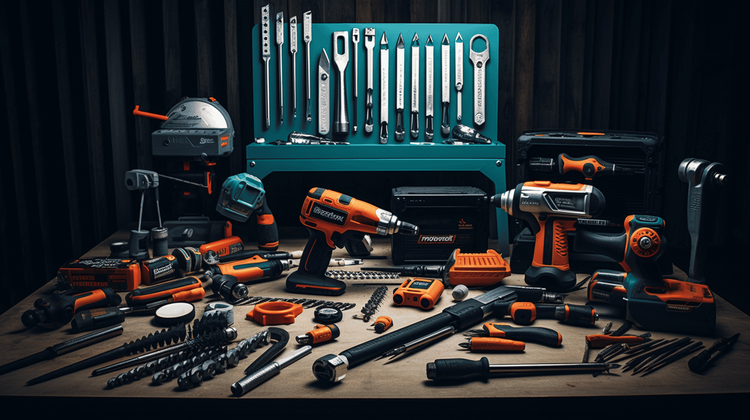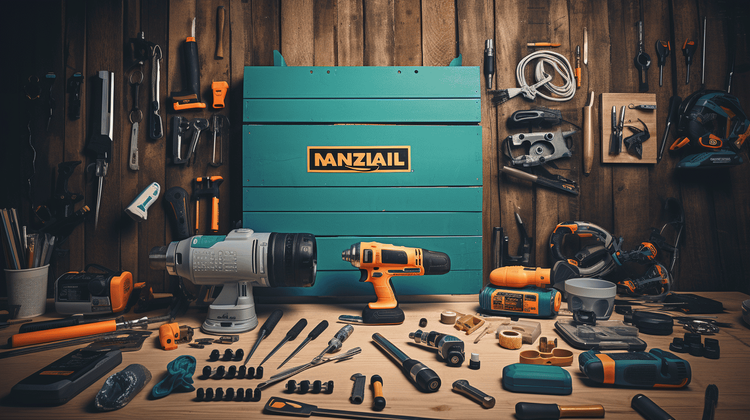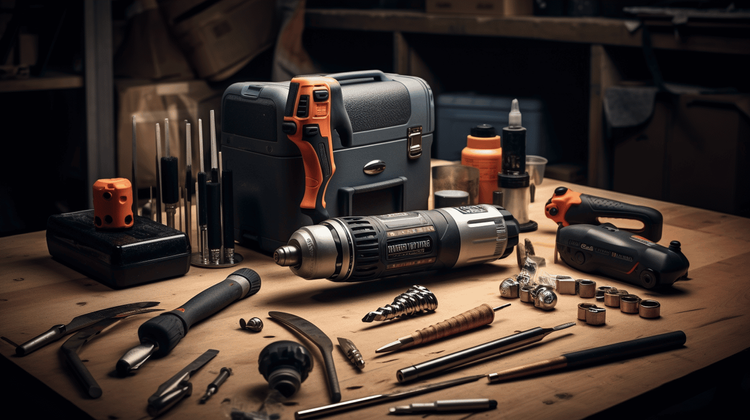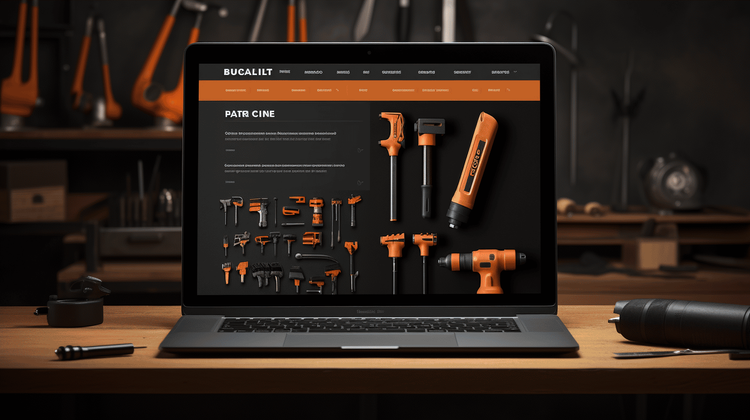The Savvy DIY Enthusiast's Guide to Scoring Deals on Tools

Are you a DIY enthusiast who loves taking on home improvement projects? If so, you know that having the right tools is essential to getting the job done. But acquiring those tools doesn't have to break the bank. In fact, with some smart strategies and a little bit of know-how, you can score great deals on quality tools that will last you for years.
In this guide, we'll take you through the savvy DIY enthusiast's journey to finding the best deals on tools. From researching quality brands to exploring different shopping options and tracking sales, we'll cover it all. So, grab your toolbox and get ready to save some serious money on your next project.
We'll discuss the following topics in detail:
- Researching Quality Tools on a Budget:
- Identifying essential tools for your projects
- Comparing different brands for quality and durability
- Reading online tool guides and recommendations
- Exploring Different Shopping Options:
- Local hardware stores and home improvement centers
- Online marketplaces and auction websites
- Garage sales and estate sales
- Tracking Sales and Discounts:
- Signing up for newsletters and alerts
- Following social media pages and influencers
- Utilizing price comparison websites
- Attending Trade Shows and Expos:
- Exploring tools demonstrations and exhibits
- Networking with manufacturers and retailers
- Attending educational workshops and seminars
- Joining DIY Communities and Forums:
- Learning from experienced DIY enthusiasts
- Sharing bargain finds and recommendations
- Seeking advice on tool purchases
- Considerations for Buying Pre-Owned Tools:
- Inspecting the condition and functionality
- Researching the resale value and demand
- Bargaining and negotiating for a better price
- Taking Advantage of Seasonal Sales:
- Black Friday and Cyber Monday deals
- Holiday and year-end clearance sales
- Off-season discounts
By the end of this guide, you'll be armed with the knowledge and strategies you need to find the best deals on tools without compromising on quality. So, let's get started!
Researching Quality Tools on a Budget
When it comes to DIY projects, having the right tools can make all the difference. But quality tools can often come with a hefty price tag. Luckily, with a little research and savvy shopping, you can find high-quality tools that fit your budget. So, how can you research quality tools on a budget? Here's a helpful guide to get you started:
Identifying Essential Tools for Your Projects
Before you start your tool research, it's important to identify the essential tools that you'll need for your projects. Make a list of the basic tools that you'll use frequently, such as a drill, hammer, screwdriver, pliers, and measuring tape. By focusing on these essentials, you can prioritize your budget and avoid wasting money on tools that you may not use often.
Comparing Different Brands for Quality and Durability
Once you have a list of essential tools, take some time to compare different brands for quality and durability. Look for reputable brands that are known for their long-lasting and reliable products. Check online reviews and ratings from other DIY enthusiasts to get an idea of the overall quality of the tools.
Reading Online Tool Guides and Recommendations
Another great way to research quality tools on a budget is by reading online tool guides and recommendations. Many DIY websites and blogs have comprehensive tool guides that provide detailed information about different tools, their features, and their price ranges. These guides can be a valuable resource when it comes to making informed decisions about which tools to invest in.
Pro Tip: Don't forget to read customer reviews on online marketplaces like Amazon. These reviews can provide valuable insights into the pros and cons of a particular tool and help you make a well-informed decision.
Now that you know how to research quality tools on a budget, it's time to explore different shopping options. Let's dive in!
Exploring Different Shopping Options
When it comes to scoring great deals on tools, exploring different shopping options can help you find the best prices and selection. Whether you prefer browsing in-store or shopping online, there are various avenues you can explore to find the tools you need at a price that fits your budget.
Here are a few different shopping options to consider:
Local Hardware Stores and Home Improvement Centers
- Convenience: Visiting your local hardware store or home improvement center allows you to see and touch the tools before making a purchase. You can ask questions and get expert advice from the staff members who are knowledgeable about the products they carry.
- Instant Gratification: If you need a tool urgently, shopping locally can be a great option as you can take it home right away instead of waiting for delivery.
- Supporting Local Businesses: Shopping at local stores helps support your community's economy and ensures that these establishments continue to thrive.
Online Marketplaces and Auction Websites
- Wide Range of Selection: Online marketplaces like Amazon and eBay offer an extensive selection of tools from various sellers, making it easy to compare prices and find the best deals.
- User Reviews: Websites like Amazon often have user reviews and ratings for products, allowing you to get insights from other customers who have purchased and used the tools you're interested in.
- Convenient Shopping: Online shopping allows you to browse and purchase tools from the comfort of your own home, saving you time and energy.
Garage Sales and Estate Sales
- Hidden Gems at Low Prices: Garage sales and estate sales can be a treasure trove for tool enthusiasts, as many people sell their used tools for a fraction of the original price.
- Room for Negotiation: At garage sales and estate sales, you often have the opportunity to negotiate the price, potentially scoring an even better deal.
- Discovering Vintage Tools: These sales can be an excellent opportunity to find unique and vintage tools that are no longer available in stores.
Remember, before purchasing tools from any source, it's important to do your due diligence and ensure the quality and condition of the items. Test out the tools if possible, and ask the seller any relevant questions to make an informed decision.
In the next section, we'll explore how you can track sales and discounts to further maximize your savings. So, let's keep reading!
[Continued in "Tracking Sales and Discounts"](#tracking-sales-and-discounts)
Tracking Sales and Discounts
As a savvy DIY enthusiast, finding great deals on tools can help you save a significant amount of money. Tracking sales and discounts not only allows you to score top-quality tools at discounted prices, but it also ensures that you are getting the best value for your money. Here are some practical strategies to help you stay on top of sales and discounts:
Signing Up for Newsletters and Alerts
- Many hardware stores and online marketplaces offer newsletters and email alerts that notify subscribers about upcoming sales and discounts.
- By signing up for these newsletters and alerts, you will be among the first to know about special promotions and exclusive deals.
- Some stores even offer special discounts or coupon codes exclusively for newsletter subscribers, giving you an extra advantage in your search for affordable tools.
Following Social Media Pages and Influencers
- Social media platforms like Facebook, Instagram, and Twitter can be valuable sources of information when it comes to sales and discounts.
- Follow the social media pages of your favorite tool brands, hardware stores, and influential DIY enthusiasts to stay updated on their latest promotions.
- Many brands and stores often announce flash sales or limited-time offers on their social media platforms, so keeping an eye on these channels can help you snag a great deal before it's gone.
Utilizing Price Comparison Websites
- Price comparison websites are excellent tools for tracking sales and discounts across multiple online retailers.
- Websites like PriceGrabber, CamelCamelCamel, and Google Shopping allow you to compare prices for a specific tool from different sellers, so you can find the best deal available.
- These websites often provide historical price data, allowing you to track the price history of a particular tool and determine if it is currently being offered at a discounted price.
Remember, staying up to date with sales and discounts requires active monitoring and regular checking. Here are some tips to help you make the most of your tracking efforts:
- Set aside some time each week to browse through newsletters, check social media platforms, and use price comparison websites to stay informed about the latest deals.
- Keep a list of the tools you are interested in purchasing. This way, you can quickly compare prices and identify if a sale or discount is genuinely worth pursuing.
- Be prepared to act fast. Sales and discounts often have limited quantities available or may only last for a short period. If you see a great deal, don't hesitate to act quickly and make your purchase before it's too late.
By utilizing these strategies and staying vigilant in your search for sales and discounts, you can score some incredible deals on tools that will enhance your DIY projects without breaking the bank. Happy bargain hunting!
Attending Trade Shows and Expos
When it comes to finding great deals on tools, attending trade shows and expos can be a game-changer for savvy DIY enthusiasts. These events are a treasure trove of opportunities to explore, learn, and connect with manufacturers and retailers in the industry.
Here are some key reasons why attending trade shows and expos should be on your radar:
- Exploring Tools Demonstrations and Exhibits: Trade shows and expos often feature live demos and exhibits where you can get hands-on experience with different tools. This allows you to see the tools in action, assess their performance, and get a feel for their quality and functionality. By physically interacting with the tools, you can make more informed decisions about which ones are worth investing in.
- Networking with Manufacturers and Retailers: Trade shows and expos bring together industry professionals, including manufacturers, retailers, and distributors. This creates a unique opportunity for you to network and establish connections with key players in the industry. Building relationships with these individuals can lead to insider tips, exclusive deals, and future opportunities to score discounts on tools.
- Attending Educational Workshops and Seminars: In addition to browsing the exhibits, trade shows and expos often offer educational workshops and seminars conducted by experts in the field. These sessions cover a wide range of topics, from tool maintenance and safety tips to advanced DIY techniques. By attending these workshops, you can expand your knowledge and skills while staying updated on the latest trends and technologies in the tool industry.
To make the most out of your trade show and expo experience, here are some tips to keep in mind:
- Research the Event: Before attending a trade show or expo, take some time to research the event and its exhibitors. Look for information on which companies will be present and what types of tools they offer. This will help you prioritize which booths to visit and ensure that you make the most of your time at the event.
- Have a Plan: Trade shows can be overwhelming with the sheer number of exhibits and activities. Create a plan and make a list of the specific tools or brands you are interested in exploring. This will help you stay focused and ensure that you cover the areas that are most relevant to your needs.
- Bring Business Cards: While attending trade shows and expos, you will likely meet many people from the industry. It's a good idea to bring along a stack of business cards with your contact information. This makes it easier to exchange information and stay connected with the professionals you meet.
- Arrive Early: Arriving early at the trade show or expo allows you to beat the crowds and have more one-on-one time with exhibitors. You'll have a better chance of scoring deals and getting personalized attention from the vendors before the rush begins.
- Take Notes: It can be overwhelming to absorb all the information and impressions you gather at a trade show or expo. Take notes as you go, jotting down key observations, pricing details, and any special offers or discounts you come across.
Attending trade shows and expos can be a fun and educational experience while offering you the opportunity to find great deals on tools. So mark your calendar and start planning your visit to the next trade show or expo in your area – you never know what bargains you might discover!
Joining DIY Communities and Forums
Being part of a DIY community or forum is a fantastic way to connect with like-minded people who share your passion for DIY projects. These communities and forums provide a wealth of knowledge, inspiration, and resources that can help you in your pursuit of finding great deals on tools. Here are some reasons why you should consider joining DIY communities and forums:
Learning from Experienced DIY Enthusiasts
DIY communities and forums are filled with experienced individuals who have a wealth of knowledge and experience when it comes to tools. By being part of these communities, you can tap into that expertise and learn from their experiences. They can provide valuable insights into which tools are worth investing in and which ones are not, helping you make informed decisions.
Sharing Bargain Finds and Recommendations
One of the major benefits of being part of a DIY community or forum is the ability to share and receive recommendations for great deals on tools. Members often share their finds, discount codes, and special offers that they come across. This can save you a considerable amount of time and money, as you can take advantage of deals that you might not have found on your own.
Seeking Advice on Tool Purchases
If you're unsure about a particular tool or brand, DIY communities and forums provide a platform to seek advice from others who might have firsthand experience with the product. You can ask questions, read reviews, and gather different perspectives before making a purchasing decision. This helps ensure that you're making an informed choice and getting the best value for your money.
By actively participating in DIY communities and forums, you can create a network of individuals who can provide you with valuable insights and recommendations. It's important to contribute to these communities as well by sharing your own experiences, recommending tools, and helping others find great deals. It's a collaborative environment where everyone benefits from each other's knowledge and expertise.
"Joining a DIY community or forum is like having a group of friends who are always on the lookout for the best deals on tools. It's a win-win situation where you get access to valuable information and contribute to the community at the same time."
Considerations for Buying Pre-Owned Tools
When it comes to buying tools, sometimes you don't need to break the bank to get high-quality equipment. Buying pre-owned tools can be a great way to save money without compromising on quality. However, before you make that purchase, there are a few important considerations to keep in mind. Here are some tips for buying pre-owned tools:
Inspecting the Condition and Functionality
Before buying any pre-owned tools, it's essential to inspect their condition and functionality. After all, you don't want to end up with a tool that doesn't work as expected or is in poor condition. Here are some things to check:
- Physical condition: Look for any signs of wear and tear, such as rust, dents, or cracks. These could indicate that the tool has been mishandled or poorly maintained.
- Functionality: Test the tool to ensure it works properly. For instance, if you're buying a power tool, plug it in and run it to see if it functions smoothly without any strange noises or vibrations.
- Moving parts: Pay attention to any moving parts, such as blades or joints. Make sure they move freely and aren't stiff or jammed.
Researching the Resale Value and Demand
Before purchasing a pre-owned tool, it's beneficial to research its resale value and demand. This information can give you an idea of whether the tool is worth the price and if it will be easy to sell later if you no longer need it. Here's how you can research:
- Online marketplaces: Check websites like eBay and Craigslist to see what similar tools are selling for. This will give you an idea of the average price range.
- Forums and DIY communities: Participate in online forums or communities where DIY enthusiasts discuss tools and their values. Ask for insights or advice from experienced members.
- Collector's items: Some tools, especially vintage or limited-edition ones, can appreciate in value over time. Research their collectible status and rarity to determine their potential future worth.
Bargaining and Negotiating for a Better Price
When buying pre-owned tools, don't be afraid to negotiate the price. Most sellers are open to bargaining, especially if the tool has been on the market for a while or if it has minor flaws. Here are some tips for negotiating:
- Do your research: Know the average market price for the tool so that you have a baseline to start your negotiation from.
- Point out flaws: If you notice any imperfections or issues with the tool, mention them during the negotiation. This can be a valid reason for a lower price.
- Bundle deals: If the seller has multiple tools for sale, consider bundling them together and asking for a discount. This can be a win-win situation for both parties.
Remember, when negotiating, be respectful and polite. Maintaining a friendly and positive attitude can go a long way in securing a better deal.
Buying pre-owned tools can be a cost-effective way to build your DIY toolkit. By inspecting the condition and functionality, researching the resale value and demand, and being willing to negotiate, you can score great deals on high-quality tools. So, don't shy away from exploring the pre-owned market. You might just find your next favorite tool at a fraction of the cost!
Taking Advantage of Seasonal Sales
As a savvy DIY enthusiast, you know that timing is everything when it comes to scoring deals on tools. One of the best times to find great discounts and save some serious money is during seasonal sales. Whether it's Black Friday, Cyber Monday, or holiday and year-end clearance sales, these events offer incredible opportunities to upgrade your tool collection without breaking the bank. In this section, we will explore how to make the most out of seasonal sales.
Black Friday and Cyber Monday Deals
Black Friday and Cyber Monday have become synonymous with incredible deals and discounts across various industries, and the tool industry is no exception. These two shopping events occur annually in late November and offer a plethora of sales that are worth checking out. Here are some tips to maximize your savings during these events:
- Research ahead of time: Before the big day, create a list of the tools you need and research their regular price, so you can identify the best deals when they come up.
- Set a budget: It's easy to get carried away with all the enticing discounts. Set a budget beforehand to ensure that you don't overspend.
- Online vs. in-store: Decide whether you prefer online shopping or visiting physical stores. Both options have their advantages, so choose the one that suits you best.
Holiday and Year-End Clearance Sales
After the holidays, many retailers offer clearance sales to clear out excess inventory and make room for new products. This is a great time to snag some incredible deals on tools. Here are some things to keep in mind during holiday and year-end clearance sales:
- Plan ahead: Research which stores are having clearance sales and make a list of the tools you're interested in. Prioritize the items you need the most.
- Keep an eye on ads and newsletters: Retailers often send out advertisements and newsletters with information about upcoming sales. Subscribe to their mailing lists to stay informed.
- Shop strategically: Visit stores strategically and go straight to the tool sections. Items marked with clearance stickers or signs are likely to be discounted, so keep an eye out for those.
Off-Season Discounts
Another way to take advantage of seasonal sales is by capitalizing on off-season discounts. During certain times of the year, when demand for tools may be lower, retailers may offer discounts to entice buyers. Here are some examples of off-season discounts to look out for:
- Spring and summer: Tools that are commonly used for outdoor projects, such as gardening tools and lawn equipment, may go on sale during the winter months when demand is lower.
- Winter: Conversely, winter months may be an excellent time to find deals on tools commonly used for indoor projects, such as power tools and woodworking equipment.
- Post-holiday season: After the holiday rush, many retailers offer discounts to attract customers. Keep an eye out for sales in January and February.
By keeping an eye out for these seasonal sales and planning ahead, you can maximize your savings and score some fantastic deals on tools. Remember to do your research, set a budget, and shop strategically. Happy shopping, and may you find the perfect tools for your DIY projects at a fraction of the price!
Conclusion
Scoring deals on tools doesn't have to be an impossible task. With the right strategies and a little bit of patience, you can find high-quality tools at budget-friendly prices. Here's a quick recap of the tips we've covered in this guide to help you become a savvy DIY enthusiast:
- Researching quality tools on a budget: Identify essential tools for your projects, compare different brands for quality and durability, and read online tool guides and recommendations to make informed choices.
- Exploring different shopping options: Check out local hardware stores, browse online marketplaces and auction websites, and keep an eye out for garage sales and estate sales for hidden gems.
- Tracking sales and discounts: Sign up for newsletters and alerts, follow social media pages and influencers, and utilize price comparison websites to stay updated on the best deals.
- Attending trade shows and expos: Explore tool demonstrations and exhibits, network with manufacturers and retailers, and attend educational workshops and seminars to gain valuable insights.
- Joining DIY communities and forums: Learn from experienced DIY enthusiasts, share bargain finds and recommendations, and seek advice on tool purchases from a supportive community.
- Considerations for buying pre-owned tools: Inspect the condition and functionality, research the resale value and demand, and don't be afraid to bargain and negotiate for a better price.
- Taking advantage of seasonal sales: Black Friday and Cyber Monday deals, holiday and year-end clearance sales, and off-season discounts can save you significant money.
Remember, it's important to strike a balance between affordability and quality. Don't compromise on safety, and invest in tools that will last you for years to come. By following these strategies, you'll be well on your way to becoming a master of DIY on a budget!
So, whether you're a beginner DIY enthusiast or a seasoned pro looking to expand your workshop, put these tips into action and watch your tool collection grow without breaking the bank. Happy tool hunting and happy DIY-ing!
Frequently Asked Questions
- Where can I find the best deals on tools?The best deals on tools can be found at various places such as online marketplaces like Amazon and eBay, local hardware stores, garage sales, and online classifieds websites like Craigslist.
- Are there any specific times of the year when tools go on sale?Yes, tools often go on sale during major shopping holidays such as Black Friday, Cyber Monday, and Memorial Day. Additionally, some stores may have special promotions during the end of the year to clear out inventory.
- How can I negotiate a better price when buying tools?When buying tools, you can negotiate a better price by comparing prices from multiple sellers, asking for a price match, buying in bulk, or purchasing floor models or display units. It's also helpful to be polite and respectful during negotiations.
- Are refurbished tools worth buying?Refurbished tools can be worth buying if they come from a reputable seller and have been thoroughly inspected and repaired. These tools are often priced lower than new ones but still offer great performance.
- What are some online resources for finding deals and discounts on tools?There are several online resources for finding deals and discounts on tools, including deal websites like Slickdeals and RetailMeNot, online tool retailers with regular sales and promotions, and subscribing to newsletters or following social media pages of tool brands for exclusive offers.




